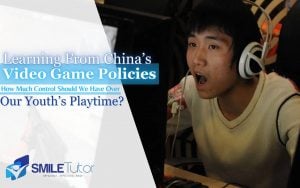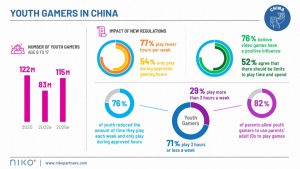
For parents who keep up to date with gaming influences on their children, I’m sure you’ve heard of the strict regulations that were mandated in China back in 2021?
Well, you haven’t? To keep you up to speed, hear this.
Youths can only play for three hours a week. That’s right, just three hours.
For better or worse, these newly established laws on gaming have since changed China’s entertainment landscape for young consumers there. Is it a dystopian nightmare for our future generation, or is this the start of a more controlled and healthier way to approach video games?
Today we explore some of these changes and impacts (no matter positive or negative), and get you thinking:
How much control should we have over our youth’s playtime?
So, What’s Up With the Gaming Restrictions in China?

[Shutterstock]
China wants to combat gaming addiction. To do that, they’re not afraid of creating a rift between parent and child.
To elaborate, we’ll briefly explain the laws put in place by China’s National Press and Publication Administration (NPPA). As long as you’re under 18, the regulations apply. This meant that one had to adhere to the following:
- Can only play online video games from 8-9pm.
- Can only play on Friday, Saturday, Sunday, and legal holidays.
- Can only play up to 90 minutes a day.
- Can only play up to 3 hours per week.
Once referred to as “spiritual opium”, you can clearly see that China isn’t very happy with youths spending time on video games!
“Teenagers are the future of our motherland,” An unnamed NPPA spokesperson commented.
“Protecting the physical and mental health of minors is related to the people’s vital interests, and relates to the cultivation of the younger generation in the era of national rejuvenation.”
But really, how effective was it to what they aimed to achieve in the country?
Did the Restrictions Work?

[Niko Partners]
Did the policies work? Or did they not? Citing a compilation of data by Niko Partners, the reports were summarised as follows:
- 77% of youths played less.
- The number of youth gamers had declined by about 40 million.
It’s clear that youths would adhere to the new regulations when they’re strictly monitored. An interview with a mother shows that her child “doesn’t spend too much time gaming anymore because she has found something else to do, such as playing with our dog or other toys.”
On the Other Hand…
In another study, however, opinions on the effectiveness of these restrictions do not paint a good light on the situation. Well, think about it for a second, and take your children for example.
You confiscate your child’s toys and games as an act of punishment and a lesson to learn. They definitely wouldn’t be happy about it. But since you’re the parent. You’re the authority. They won’t speak out to you about their grievances, especially if they’re in a defiant phase.
Abusing Loopholes to Continue Playing

[Freepik]
So what do these youths resort to? Loopholes.
Yes, these regulations wouldn’t fully achieve their goals, they only made it harder for the truly dedicated gamers to play. In fact, Niko Partner’s report has also indicated that not all youth gamers complied with the new rules.
From bypassing limits using adult accounts (family or friends), going through international platforms like Steam to have unrestricted access to games, or even purchasing unapproved console games via the grey market, the truly dedicated youngsters will resort to any means to have their regular routines returned.
Heavy gaming remained consistently high in China when monitored through Unity, a game development tool. This was yet another piece of evidence that indicated the short-sightedness of China’s policies.
Redirecting to Similar Addictions

That’s not all! Experts had also raised concerns about the vagueness of these policies since its implementation. After all, they may seem strict on the surface, but a limit in playing games did not restrict these youths to approach other alternatives.
For example, social media. And also, idolising online personalities either through esports, streaming services or excessive video consumption. We know for a fact that it’s been an ongoing trend that youths are a big live demographic to esports competitions, and that social media apps like Douyin and TikTok continue to propagate their influence among youngsters within China.
Similarly unhealthy and addictive media ultimately results in similar problems that the government was trying to fix, sparking a stronger debate on China’s policies.
Designed to Make You Keep Playing

It is also said that blanket policies do not address the problem at hand, namely the nature of how game companies have designed their products.
Think from the perspective of these game companies. How would they best capture a player’s loyalty towards their games, and ensure player longevity?
Video game designers create the games to be highly engaging and to make the user want to keep playing. For children who usually do not exercise discipline when it comes to their fun, they have a very hard time stopping once they get stuck in the positive feedback loops that these games create.
From daily log-in bonuses, to a recharging “stamina system”, they’re made so that players will want to stay online for longer, or come back for more. If children are required to stop playing games, they’ll just switch to other apps instead.
What Does This Mean For Singaporean Parents?

So, relating to China’s way of curbing game time for youths, what can we learn from it?
China is clearly different from us.
Our lifestyles are different, our cultures are different, and so follows the context of lower playtime. What remains as the common truth that we share, however, is that playing games for too long is never a good thing for youths.
As such, there may come a time when you will be forced to make the decision of reducing, or banning playtime for your children.
So how do you gauge the level of action you should take here? Well, here are a few factors to consider!
Setting Standards For Your Child

Your child has been initiated into the world of video games.
Ultimately, as they say, it’s up to parents to nurture good habits and set screen time limits. As role models, you must have expectations of your child.
YOU are the one that sets and enforces the standard. This anchors them with a weight of responsibility that tells them, “Hey, are you sure you wanna do that? Will my parents be disappointed if I do that?”
These expectations can be healthy when you manage them properly, bringing your child closer to being independent. Through both reward and punishment, impart values and goals that your youth would want to reach by themselves.
When they’ve grown a certain level of responsibility for their own well-being, the overindulgence of games will become a distant thought. Of course, be sure to check back on them periodically, so that you know that they’re still committed and are on the right track!
Prevention Through Understanding

[Freepik]
At a stage where your youth has noticeably gotten a little more involved with video games…
Learning that strict policies can earn the ire of our children can be really daunting. For parents who choose not to take the hardest approach, understanding becomes necessary as the first step.
The channel to openly discuss and butt heads should be done when both parent and child are aware of expectations and boundaries.
“I need to play games to de-stress!”
“You shouldn’t play past midnight if it affects your sleep.”
Openly converse and understand each other. Address refusals empathetically and logically should you choose to take away your youth’s playtime.
Understand what types of games your child is playing, and how they function, so that you are in a better position to involve yourself in the conversation.
Curbing Gaming Addiction

[Freepik]
Gaming addiction is serious business. If you’re in a situation where you’ve confirmed the signs of gaming addiction, take ACTION!
Do not spoil your youth. Because stopping the addiction requires interference! Some kids are much more deeply involved with video games and setting limits in these cases will be harder.
It is easy to give you the solution to have them quit gaming cold turkey. Pull the plug, confiscate devices, lock them with passwords; trust us, we’ve all been there. And it’s never been pretty. It’s an ultimatum that leaves both parent and child with a bitter taste.
But well, we’ll leave the experts on the side of measures AFTER addiction. Do you approach slowly? Seek a third party for assistance? Or simply compromise with parental controls on these games? Be sure to think it through! In the process of curbing that addiction, we may sometimes neglect or invalidate our youth’s emotions. So be really careful and be there for them every step of the way.
Focusing on What Matters

[Freepik]
Breaking away from the decisions that you may choose to make after hearing about China, and what we can learn from their policies, I think that it is important to take a step back and ponder about “why” we are doing this in the first place!
Could it be that one of the main reasons that youths overindulge in video games is loneliness?
In some way or another, that also means neglect in certain ways especially when it comes to working parents!
You may be busy with work, and so it stands that involvement with your kids will become lesser as a result. This is inevitable, but remember that part of the cause that youths turn towards online entertainment is due to a lack of attention from their parents!

Their young, active minds prevent them from relaxing. In this day and age, modern entertainment never leaves the eyes of our youths for a minute! As an indirect influence, many kids choose to turn to games in order to feel “occupied”.
While work and life priorities are balanced at the whims of the adult, you are first and foremost a parent! Do not make excuses for not being there for your child because your work is more important!
Even if it is, there are also healthy alternatives like helping children to cultivate hobbies and interests instead! In this way, you give your child a small push towards their personal development, which can often be a good distraction from their instincts to turn towards their digital devices.
In the end, the best kind of control set for our youths today, is themselves.
